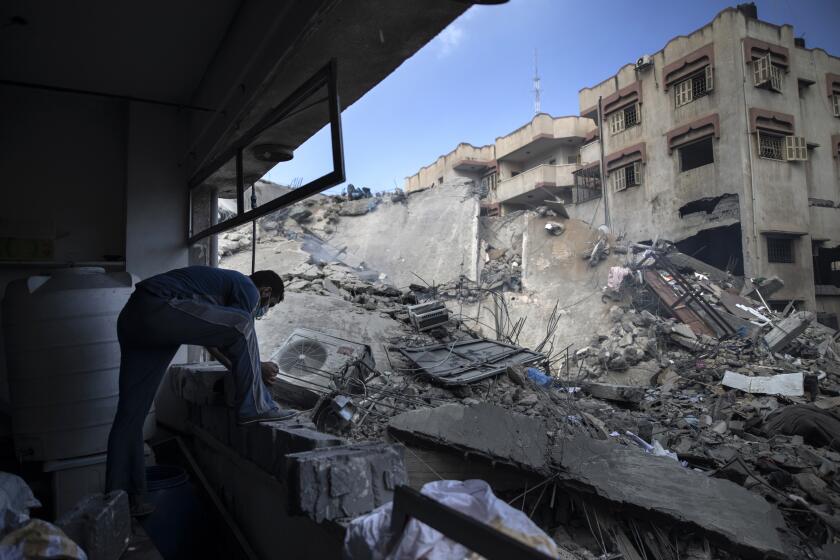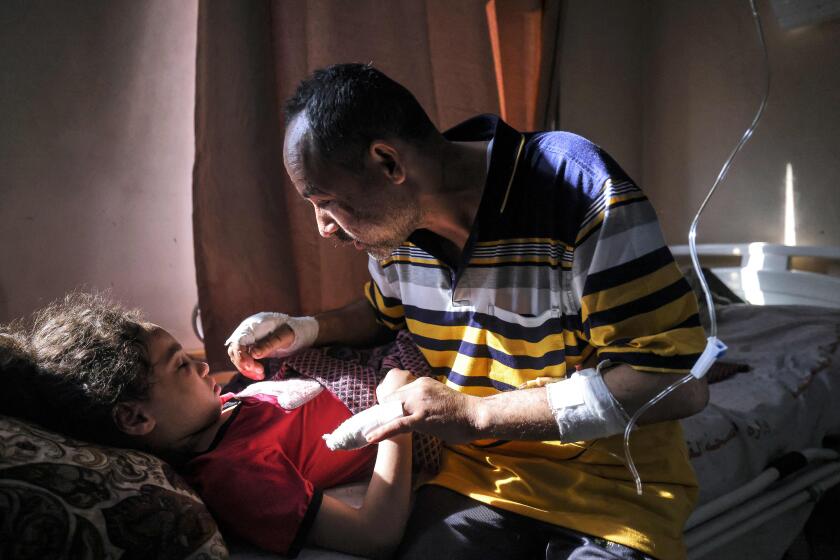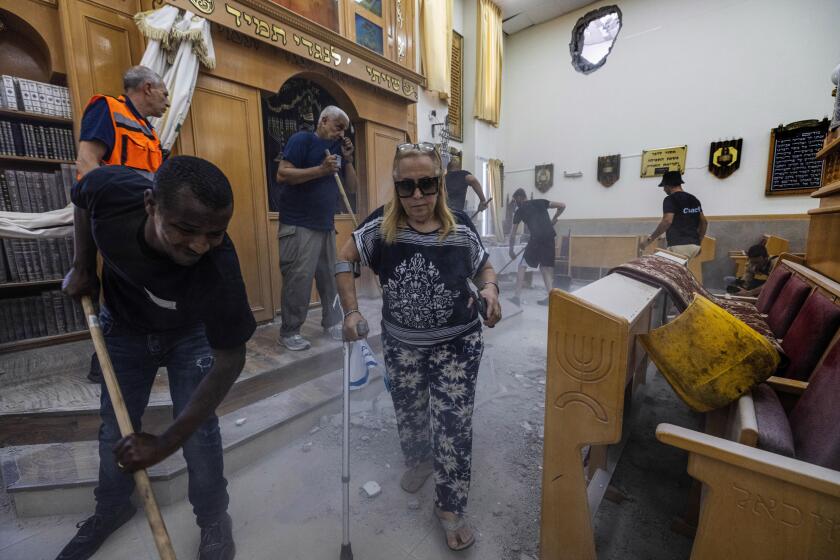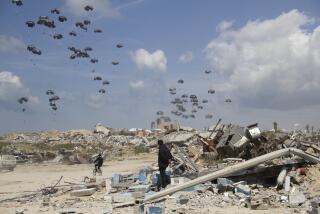Cease-fire between Israel and Hamas begins as both sides declare a victory
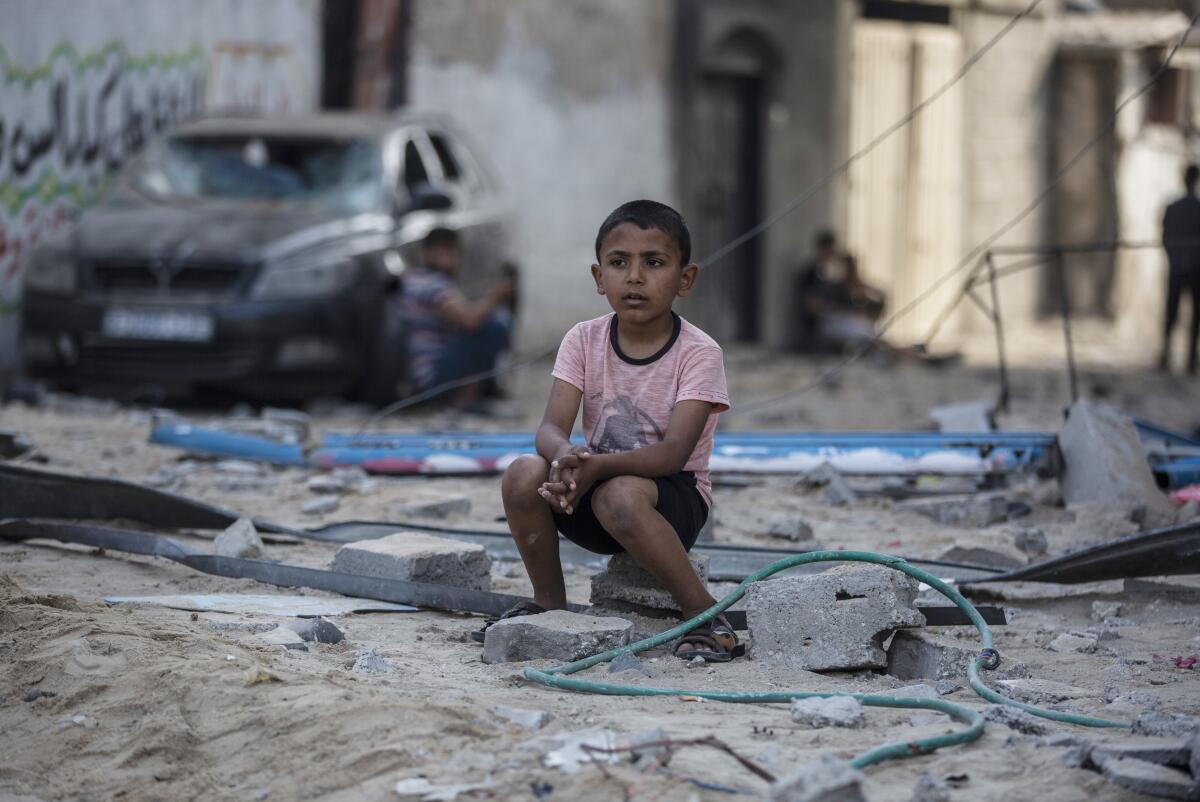
A cease-fire in the Gaza Strip appeared to hold well into the morning Friday, hours after Israel and Hamas militants announced that they would comply with an Egyptian-brokered agreement to stop armed hostilities.
The truce began 2 a.m. Friday. Skies that had continually been lit up by rocket fire from Gaza into Israel or rent with the thunder of Israeli airstrikes on the territory were dark and quiet till dawn. The calm held as residents on both sides of the Israel-Gaza border emerged from their homes to go about their morning business.
Israel and Hamas militants announced the cease-fire Thursday after 11 days of cross-border fighting that killed scores of people, the vast majority of them Palestinians, and threatened to destabilize the volatile region.
The truce followed mounting pressure from the U.S., Egypt and other international brokers to halt the violence.
A statement from Israeli Prime Minister Benjamin Netanyahu’s office said his top security officials, after an intense day of consultations, “unanimously” approved a “bilateral cease-fire without preconditions.”
“The political leadership emphasized that reality on the ground is what will determine if the campaign continues or not,” the statement said.
Abu Ubaida, the spokesman for Hamas’ military wing, said in an audio statement that his group agreed to the truce and claimed it had been able to “humiliate” its Israeli adversary.
President Biden, whose pressure on Netanyahu undoubtedly played a role in the Israeli leader’s decision to pull back forces, welcomed the reports with caution.
Biden praised concerted international efforts that brought about the cease-fire with the goal of “avoiding the sort of prolonged conflict we’ve seen in previous years.” He pledged to “continue our quiet and relentless diplomacy” toward equal prosperity and security for Israelis and Palestinians, the longer-term elusive goal.
Thursday’s steps came a day after Biden telephoned Netanyahu for the third time in four days to insist on a “significant de-escalation” immediately.
Also Thursday at the United Nations, U.S. officials sounded defensive, emphasizing they had worked to quell violence even as they blocked Security Council resolutions and supported Israel’s right to self-defense.
“We have not been silent,” U.S. Ambassador Linda Thomas-Greenfield said, noting that the Biden administration was working “urgently” and “fervently” toward peace. Initially, when the conflict erupted 11 days ago, Biden came under criticism for failing to respond quickly.
The statement from the Israeli prime minister’s office pointedly referred to the cease-fire as an Egyptian initiative. Egypt has singular influence over Hamas; the U.S. regards the group as a terrorist organization and, as such, cannot negotiate with its leaders.
Cairo brokered the end to the last major Israel-Hamas battle, which lasted 50 days in 2014 and killed more than 2,200 people.
But commentators also wondered if Netanyahu was attempting to avoid giving credit to Biden. After initially expressing support for Israel’s military operation, the president shifted course, pressing Netanyahu to step back from the wholesale death and destruction that Israeli forces were spreading throughout the Gaza Strip.
Both Israelis and Palestinians were able to portray themselves as victors — a face-saving tactic that helped make the cease-fire possible — while also declaring themselves ready to resume fighting if necessary.
Israeli Defense Minister Benny Gantz said the military had succeeded in its goal of “degrading” Hamas’ military capabilities, including the production of an abundant supply of more sophisticated missiles that could rain on the country.
Israel’s Iron Dome air-defense system intercepted most of the rockets from Gaza, but the steady barrage strained the defense network.
The defense establishment remains ready, Gantz said, to disable what he called terrorist organizations in Gaza.
Similarly, Abu Ubaida, the Hamas spokesman, said, “We have prepared well for this battle, and we still have more and more, God willing.”
There seemed to be a lull Thursday in Israeli bombardment of Gaza and in Hamas’ rocket fire toward Israeli cities.
By contrast, earlier in the day Israel continued its assault on the coastal enclave, killing at least one Palestinian woman and wounding dozens of other people.
Israeli warplanes and artillery pounded the Palestinian territory overnight, including Deir al Balah, a town in central Gaza; Khan Yunis in the south; and areas in the northern part of the strip. By morning, a lull in rocket fire from Gaza ended with sirens signaling renewed volleys over southern Israel.
Since May 10, Israel’s aerial assault has killed at least 230 Palestinians, including 65 children, according to the Health Ministry in Gaza, which is governed by Hamas. An additional 1,710 people have been injured. In Israel, 12 people have been killed, including a soldier, a teenager and a 5-year-old.
The Israeli military said it destroyed a number of Hamas targets, including weapon caches, a tunnel and rocket launch sites. Residents in northern Gaza reported a powerful bombardment near the main highway linking the area to the city.
Late Thursday morning, the Izzidin al-Qassam Brigade, the military wing of Hamas, said it hit an Israeli military bus near the Gaza border with an antitank missile. Israel’s military confirmed the strike but said that the bus was empty and that a soldier was only lightly wounded by shrapnel. Since the start of the war, Hamas has launched more than 4,000 rockets toward Israeli territory, Israel’s military said, adding that the Iron Dome missile-defense system had blocked 90% of rockets over population centers.
Despite stronger pressure from the U.S. for a cease-fire, hostilities had continued, with Netanyahu insisting that he was “determined to continue in this operation until its objective is achieved — to bring back the quiet and security to … citizens of Israel.
Past fighting between Israel and Hamas offers a window into current conflict — and how it could end
“We’re not standing with a stopwatch in our hand; rather, we are making sure to meet the goals of this operation,” Netanyahu said in a briefing to ambassadors Wednesday, according to the Jerusalem Post.
Still, there were reports Thursday that a truce could arrive by Friday. An Egyptian intelligence official, who spoke on condition of anonymity to discuss the delicate talks, told the Associated Press that Biden’s appeal for calm had bolstered Cairo’s efforts to halt the fighting. Egypt has been a frequent broker of truces.
“The U.S. government wants a cease-fire already,” Gilad Erdan, Israel’s ambassador to the U.S., told Israeli radio on Thursday. “There is no disagreement between us on that. We also want this fighting to end quickly … but we need to know that the Hamas infrastructure has been sufficiently damaged.”
The European Union had called for a halt to the violence. On Thursday, German Foreign Minister Heiko Maas landed in Israel to meet with Netanyahu and other ministers to help push for a cease-fire.
Israel continues its assault on the Gaza Strip as the U.S. and others call for a cease-fire.
Accompanied by Israeli Foreign Minister Gabi Ashkenazi and army officials, Maas toured an apartment building hit by a missile in Petah Tikva, a suburb of Tel Aviv. Maas walked through the living room of a badly damaged apartment; in the parking lot were several burned-out cars.
In a briefing, Maas reiterated Germany’s support for Israel, saying it “must be able to protect its citizens” against any groups that threaten it “with annihilation.”
But he also added that his country supported “the international efforts for a cease-fire” and was “convinced that it is in the interest of the people on both sides that the violence ends as quickly as possible.”
Islamic Jihad, another militant group operating in Gaza, denounced Maas’ comments as “racist” and rooted in a colonial outlook.
Militants in the Gaza Strip have fired more than 3,200 rockets at Israeli cities since the latest war between Hamas and Israel erupted last week.
The Czech and Slovakian foreign ministers were also expected in Israel on Thursday, local media reported.
The fourth war between Hamas and Israel began this month after Israeli police stormed Jerusalem’s Al Aqsa Mosque, firing tear gas and rubber bullets at Palestinian protesters gathered inside during the last days of the Muslim holy month of Ramadan. It added to tensions already heightened by Jewish settlers and right-wing Jewish nationalist groups threatening the eviction of six Palestinian families in the East Jerusalem neighborhood of Sheik Jarrah.
Since then, Israel’s bombing of Gaza has been relentless, with residents bearing the brunt of the operation despite the Israeli military saying it takes precautions to avert civilian casualties. On Wednesday, a missile slammed into the third-floor apartment where Eyad Salha, 35, his pregnant wife, Amani, and their 3-year-old daughter were about to have lunch.
“We were on the way to my sister’s place when we heard the sound of a raid. We then got a phone call telling us our apartment was targeted,” said Omar Salha, Eyad’s 31-year-old brother. “We came and found them in pieces.”
Breaking News
Get breaking news, investigations, analysis and more signature journalism from the Los Angeles Times in your inbox.
You may occasionally receive promotional content from the Los Angeles Times.
The onslaught has also devastated wide sections of Gaza, including houses, high-rises used for both commercial and residential purposes, farmland, roads and other infrastructure.
On Thursday, the Gaza municipality said an attack on the Saftawi area cut one-fifth of the city’s water supply. The Ministry of Education issued a statement saying 46 schools had been damaged in the barrage.
“There is no military necessity for this amount of destruction,” Jamil Sarhan, head of the Independent Commission for Human Rights in Gaza, told reporters Thursday outside Shifa Hospital in Gaza City.
Special correspondent Kraft reported from Tel Aviv and Times staff writers Bulos and Wilkinson from Beirut and Washington, respectively. Special correspondent Hana Salah in Gaza City contributed to this report.
More to Read
Start your day right
Sign up for Essential California for news, features and recommendations from the L.A. Times and beyond in your inbox six days a week.
You may occasionally receive promotional content from the Los Angeles Times.
